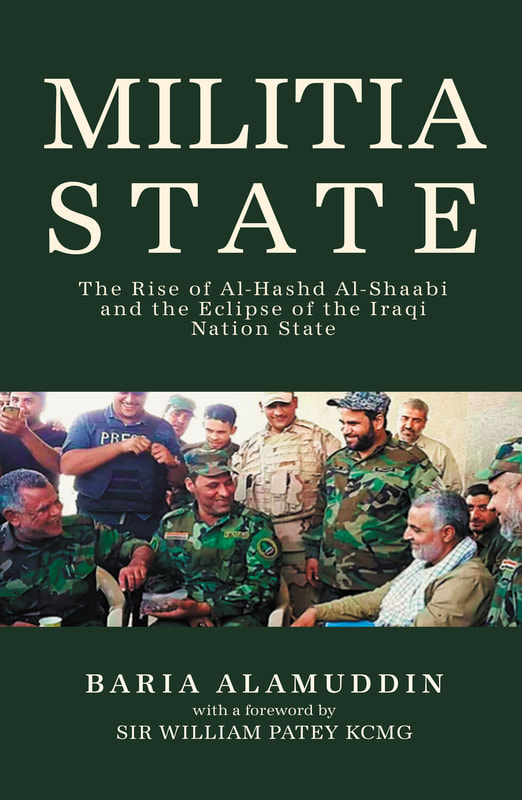|
Out of Print
Review Coverage
|
Militia State
The Rise of Al-Hashd Al-Shaabi and the Eclipse of the Iraqi Nation State Baria Alamuddin with a foreword by Sir William Patey KCMG “The Quds Force of the Iranian Revolutionary Guards has crossed mountains and plains to end America’s dominance in the eastern Mediterranean, and reached the Red Sea, and turned the Islamic land to land of jihad… We have to expand our capabilities from the region to the world, so the enemy has no safe point” “A distinguishing feature of the last 40 years from Lebanon to Iran has been the displacement of state power and legitimacy by parasitic sectarian actors who enforce their claims to authority through criminality and unchecked violence. The model for this is Khomeinist Iran and its partners in Lebanese Hezbollah. The process has accelerated since 2003 - when the folly of the US and its allies and the degeneration of the Syrian uprising into brutal civil war opened up new territories for Tehran. The rise of the Hashd al Sha’abi in Iraq is the most dramatic expression of this political pathology. Drawing widely on published sources, confidential diplomatic reporting and interviews with many of the key players, the vastly experienced Baria Alamuddin describes this process with chilling immediacy and vivid detail. If you care about the future of the region, read this book.” This is the story of how the Iraqi state has been steadily stripped of its sovereignty, identity, and the trappings of statehood by predatory militias, aided and abetted by the Iranian regime. This is the story of the journey from nation-statehood, to militia-statehood.
This book is principally concerned with the Iraqi militia coalition known as Al-Hashd al-Shaabi [the Popular Mobilization Units - PMU] but more broadly, it relates the malign consequences of Tehran’s interference across the Middle East region. The Hashd’s most significant paramilitary forces were armed and mobilized by Iran, and through their actions and objectives, the nature of Iran’s destabilizing agenda towards the region can be better understood. CONTENTS
Foreword § Acknowledgements § Introduction § What does Iran want? § Chapter 1: A tale of two revolutions - Origins of Da’wah & the Badr Brigades § Chapter 2: Revolution of the dispossessed - Origins of the Sadrist movement § Chapter 3: Muqtada al-Sadr confronts the occupation § Chapter 4: Badr infiltrates the security services § Chapter 5: Sectarian bloodbath in Baghdad § Chapter 6: Iran backs a new horse - The birth of Asaib Ahlulhaq § Chapter 7: If we lose Syria, we lose Tehran § Chapter 8: How Maliki broke Iraq § Chapter 9: Concessions to hostage-takers § Chapter 10: New militias led by old militants § Profiling the Hashd § Chapter 11: Who lost Mosul? § Chapter 12: Putting the fox back in charge of the henhouse § Chapter 13: Barack Obama & the Hezbollah Battalions liberate Amerli § Chapter 14: Vengeance upon the Sunni cities § Chapter 15: Following the money trail back to Abu-Mahdi al-Muhandis § Chapter 16: Conquering central Iraq & forging routes into Syria § Chapter 17: Mobilizing Ninawa’s minorities against each other § Chapter 18: The war for socio-economic dominance § Chapter 19: Donald Trump vs. Qassim Soleimani § Chapter 20: The war for electoral dominance § Appendix § Protagonists index § Acronyms & abbreviations § Index § References |
About the Author
Baria Alamuddin is an award-winning international journalist and broadcaster. She recently received a “Lifetime Achievement Award” from the 2018 Commonwealth Businesswomen Awards; and the 2018 Arab Women of the Year Award, for Achievement in Media, through Regent’s University, London. She is the founder of Media Services Syndicate and has interviewed numerous heads of state including; Margaret Thatcher, Benazir Bhutto, King Hussain of Jordan, Yasser Arafat and Fidel Castro, to name a few. Baria was the last journalist to interview Prime Minister Indira Gandhi. Over the course of her career she interviewed hundreds of Western, Arab and global politicians, diplomats, cultural figures and other luminaries. For many years she was Editor at Large for leading Arab newspaper Al-Hayat and is now a columnist for the Arab News. She is currently at the final stages of publishing two books with Middle Eastern themes. Baria was a News Anchor for Lebanese Television, and in-house Middle East analyst for CNN. She makes numerous appearances as an analyst on Middle Eastern affairs on channels like the BBC (TV and radio; regularly participating on DateLine London), Sky News, ITN, CNBC, Al-Arabia, Al-Jazeera and many other channels. During the 1980s and 1990s she wrote regular columns for Al-Sada, Ar-Rajul and Al-Hawadith publications, along with contributing to First Magazine. Baria was also a journalist for Sawt al-Kuwait radio 1990-91 during the Iraqi occupation of Kuwait. Baria is a frequent guest speaker and moderator at international conferences. She was the President of the International Arab Charity since 2004 and was a member of the advisory board of the Tallberg Forum in Sweden. She is a member of the board of directors of the British Lebanese Association in London. Baria is the director of the media company International Communications Experts (ICE), as part of which Baria taught communications courses at Westminster University & East Anglia University, along with providing extensive communications and media training to dozens of prominent figures around the world. Baria is married and has two daughters, Tala and Amal. |



